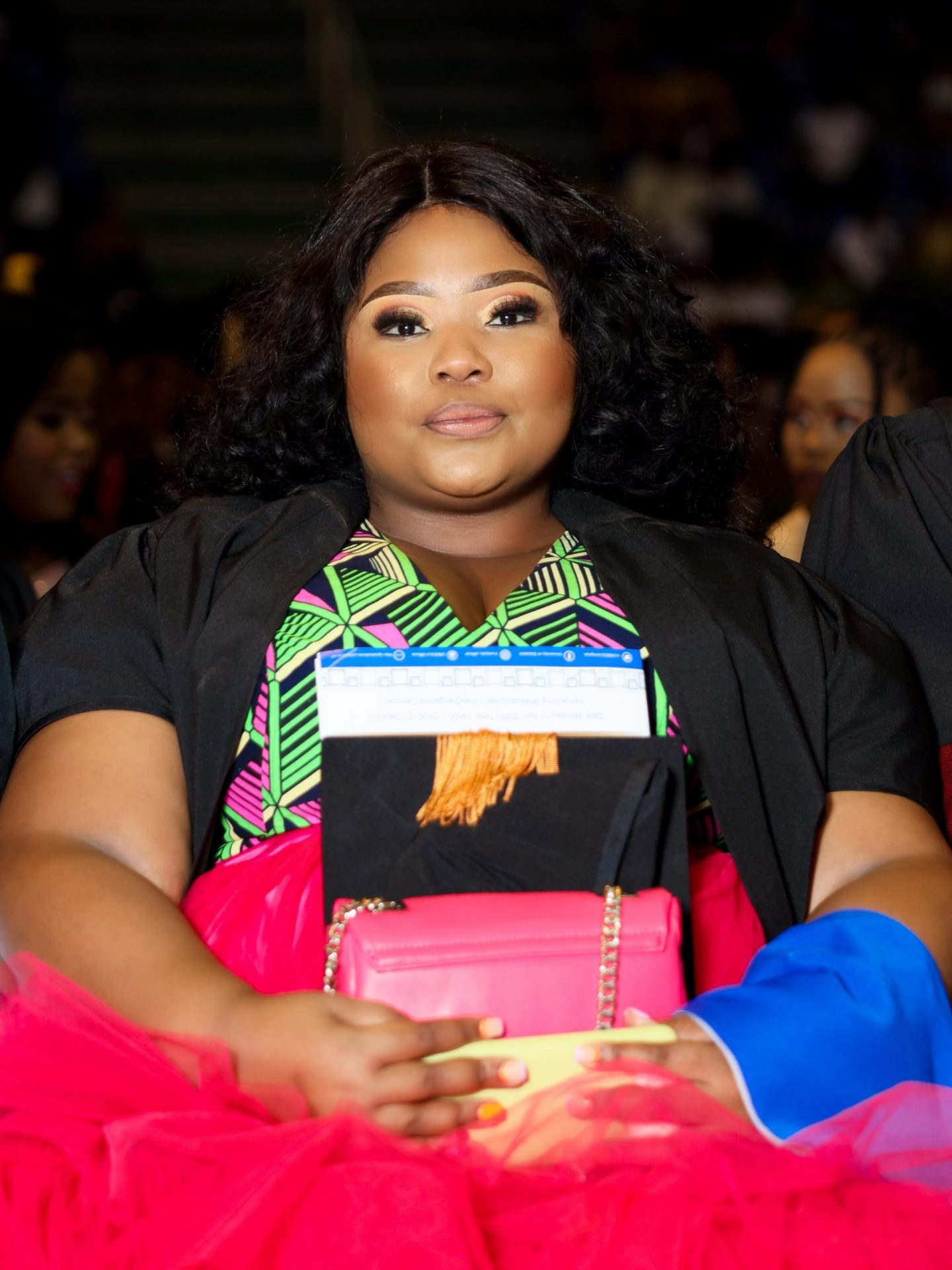Mngomezulu’s Study Seeks to Find Source of Scarce Female Leaders in Tertiary Institutions

There are no words that could effectively describe the excitement Noluthando Bongeka Mngomezulu felt when she finally obtained her Master of Commerce (Business Management) qualification on Monday, 17 April.
Over and above achieving one of her academic goals, the graduate also celebrated attaining a distinction for her master’s degree.
Thirty-year-old Mngomezulu from Esikhawini in Empangeni commenced her master’s journey in 2020, her study focusing on an issue she feels strongly about: women leadership. Her dissertation is titled “Poor Representation of women in managerial positions in Tertiary institutions in KwaZulu-Natal: Focus on Female Head of Departments”.
“I am a feminist at heart and seeing women lead really excites me,” she said, adding that she was motivated to select her topic by her supervisor Prof Vezi-Magigaba’s rise to the top. “When I arrived in UNIZULU in 2014, Prof Vezi-Magigaba was just Mrs Magigaba. Seeing her become a doctor and then Head of Department made me inquisitive about other women in leadership positions,” Mngomezulu said.
Her study was qualitative in nature and utilised the interpretivist paradigm (which relates to the understanding that one’s reality can only be fathomed through that person’s experiences of that reality, which may differ from another person’s due to the individuals’ historical or social perspective). Semi- structured interviews were conducted as a data collection instrument.
From the interviews, the graduate gathered that there are multiple reasons why women are poorly represented in managerial positions in tertiary institutions. The responses varied from feelings of inferiority (sometimes attributed to one’s assumed leadership incapabilities constantly being raised by their counterparts) to family responsibilities, fear of the unknown and no interest in occupying a managerial position.
“It was revealed through literature that more women than men graduate for their undergraduate and postgraduate degrees, but very few of them are in managerial positions. My study has revealed that yes, there are women who have successfully landed themselves in leadership positions, through hard work. It is unfortunate that women still face certain hindrances. The fact that men and women are treated differently in similar positions in the workplace is astonishing. A man could be a father and have family responsibilities and still be treated normally in the workplace but if a woman is a mother with family responsibilities she is labelled as a “working mom” and could be put at a disadvantage because of these responsibilities,” said Mngomezulu.
The reason for the poor representation of women in managerial positions in higher education, according to Mngomezulu, remains unknown. However, she is pleased that her study has shed light on the female/male leader ratio and the urgency to fill this gap.
She had three recommendations pertaining to the topic. Firstly, she suggests holding gender equality workshops and women empowerment workshops that will be attended by both men and women. She also recommended that tertiary institutions introduce mentorship programs that will see women in leadership hosting seminars for female staff and students aspiring to assume leadership roles. Finally, she believes a similar study should be conducted with male heads of departments. This would provide a worthy comparison of the journeys male and female academics take to leadership.
“My master’s journey taught me that nothing is impossible if you put your mind and efforts into it. When starting this journey, I personally had a lot of doubt on whether I would be able to even finish a master’s degree. The minute I started believing in myself, things became easier,” the graduate shared.
Mngomezulu is currently serving in UNIZULU’s Human Resources Department as a data capturer for the recruitment project. She sees herself as a PhD holder and working as an academic soon.
– Mbuyiselo B. Mlaba and Naledi Hlefane
Caption
Noluthando Bongeka Mngomezulu, Master of Commerce (Business Management) graduate.
Picture by: James Thwala














One Comment
Can you be more specific about the content of your article? After reading it, I still have some doubts. Hope you can help me.